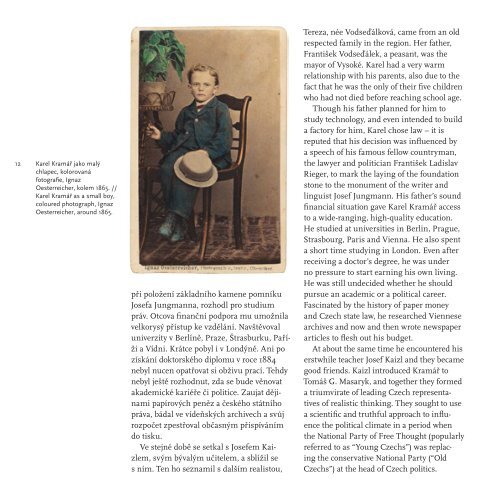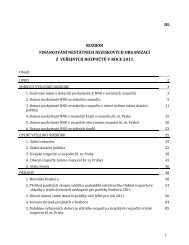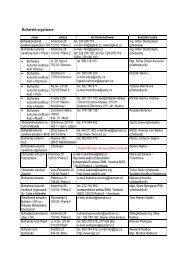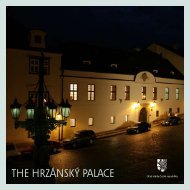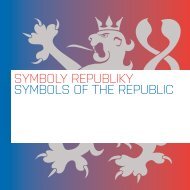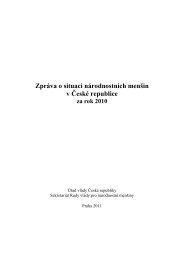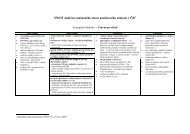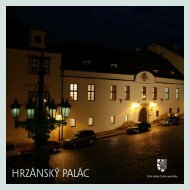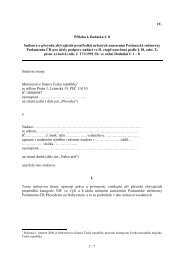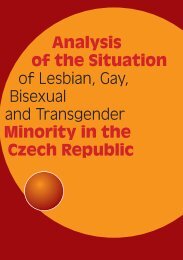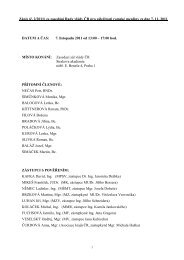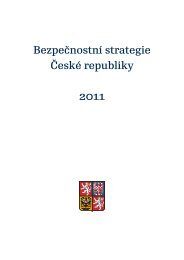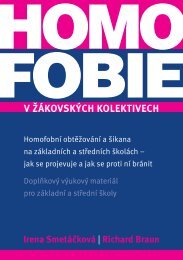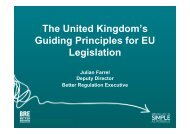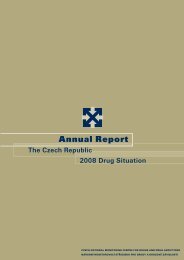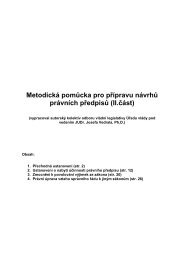Create successful ePaper yourself
Turn your PDF publications into a flip-book with our unique Google optimized e-Paper software.
12<br />
Karel Kramář jako malý<br />
chlapec, kolorovaná<br />
fotografie, Ignaz<br />
Oesterreicher, kolem 1865. //<br />
Karel Kramář as a small boy,<br />
coloured photograph, Ignaz<br />
Oesterreicher, around 1865.<br />
při položení základního kamene pomníku<br />
Josefa Jungmanna, rozhodl pro studium<br />
práv. Otcova finanční podpora mu umožnila<br />
velkorysý přístup ke vzdělání. Navštěvoval<br />
univerzity v Berlíně, Praze, Štrasburku, Paříži<br />
a Vídni. Krátce pobyl i v Londýně. Ani po<br />
získání doktorského diplomu v roce 1884<br />
nebyl nucen opatřovat si obživu prací. Tehdy<br />
nebyl ještě rozhodnut, zda se bude věnovat<br />
akademické kariéře či politice. Zaujat dějinami<br />
papírových peněz a českého státního<br />
práva, bádal ve vídeňských archivech a svůj<br />
rozpočet zpestřoval občasným přispíváním<br />
do tisku.<br />
Ve stejné době se setkal s Josefem Kaizlem,<br />
svým bývalým učitelem, a sblížil se<br />
s ním. Ten ho seznamil s dalším realistou,<br />
Tereza, née Vodseďálková, came from an old<br />
respected family in the region. Her father,<br />
František Vodseďálek, a peasant, was the<br />
mayor of Vysoké. Karel had a very warm<br />
relationship with his parents, also due to the<br />
fact that he was the only of their five children<br />
who had not died before reaching school age.<br />
Though his father planned for him to<br />
study technology, and even intended to build<br />
a factory for him, Karel chose law – it is<br />
reputed that his decision was influenced by<br />
a speech of his famous fellow countryman,<br />
the lawyer and politician František Ladislav<br />
Rieger, to mark the laying of the foundation<br />
stone to the monument of the writer and<br />
linguist Josef Jungmann. His father’s sound<br />
financial situation gave Karel Kramář access<br />
to a wide‐ranging, high‐quality education.<br />
He studied at universities in Berlin, Prague,<br />
Strasbourg, Paris and Vienna. He also spent<br />
a short time studying in London. Even after<br />
receiving a doctor’s degree, he was under<br />
no pressure to start earning his own living.<br />
He was still undecided whether he should<br />
pursue an academic or a political career.<br />
Fascinated by the history of paper money<br />
and Czech state law, he researched Viennese<br />
archives and now and then wrote newspaper<br />
articles to flesh out his budget.<br />
At about the same time he encountered his<br />
erstwhile teacher Josef Kaizl and they became<br />
good friends. Kaizl introduced Kramář to<br />
Tomáš G. Masaryk, and together they formed<br />
a triumvirate of leading Czech representatives<br />
of realistic thinking. They sought to use<br />
a scientific and truthful approach to influence<br />
the political climate in a period when<br />
the National Party of Free Thought (popularly<br />
referred to as “Young Czechs”) was replacing<br />
the conservative National Party (“Old<br />
Czechs”) at the head of Czech politics.


